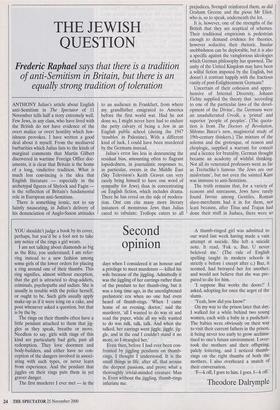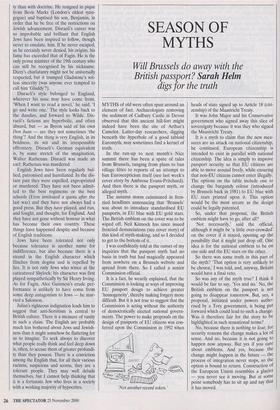THE JEWISH QUESTION
Frederic Raphael says that there is a tradition
of anti-Semitism in Britain, but there is an equally strong tradition of toleration
ANTHONY Julius's article about English anti-Semitism in The Spectator of 11 November tells half a story extremely well. Few Jews, in any class, who have lived with the British do not have evidence of the overt malice or overt hostility which Jew- ishness provokes. I have written a good deal about it myself. From the mediaeval barbarities which Julius lists to the kinds of marginal comments that Martin Gilbert discovered in wartime Foreign Office doc- uments, it is clear that Britain is the home of a long, vindictive tradition. What is much less convincing is the idea that English literature — especially in the archetypal figures of Shylock and Fagin — is the reflection of Britain's fundamental role in European anti-Semitism.
There is something ironic, not to say faintly nauseating, in Julius's delivery of his denunciation of Anglo-Saxon attitudes to an audience in Frankfurt, from where my grandfather emigrated to America before the first world war. Had he not done so, I might never have had to endure the petty calvary of being a Jew in an English public school (during the 1947 `troubles' in Palestine). With a different kind of luck, I could have been murdered by the Germans instead.
Julius's error lies less in denouncing the residual bias, amounting often to flagrant lopsidedness, in journalistic responses to, in particular, events in the Middle East (Sky Television's Keith Graves can very rarely bring himself to have one word of sympathy for Jews) than in concentrating on English fiction, which includes drama. There he has erred on the side of modera- tion. One can cite many more literary instances of monstrous Jews than Julius cared to tabulate: Trollope caters to all prejudices, Svengali reinforced them, as did Graham Greene and the pious Mr Eliot, who is, so to speak, underneath the lot.
It is, however, one of the strengths of the British that they are sceptical of schemes. Their traditional empiricism is pedestrian enough to demand evidence for theories, however seductive their rhetoric. Insular snobbishness can be deplorable, but it is also a specific against the vainglorious ideologies which German philosophy has spawned. The unity of the United Kingdom may have been a wilful fiction imposed by the English, but doesn't it contrast happily with the fractious vanity of post-Enlightenment Germans?
Uncertain of their cohesion and appre- hensive of Internal Diversity, Johann Fichte supplied the theory that 'according to one of the particular laws of the devel- opment of the Divine', the Germans were an unadulterated Urvolk, a 'primal' and superior 'people of peoples'. (The quota- tion is from The Doctors of Revolution, Shlomo Barer's new, magisterial study of 19th-century thinkers.) The mixture of the solemn and the grotesque, of reason and choplogic, supplied a warrant for conceit and a licence for brutality. German thought became an academy of wishful thinking. Not all its venerated professors went as far as Treitschke's famous 'the Jews are our misfortune', but not even the sainted Kant was immune to anti-Semitism.
The truth remains that, for a variety of reasons and unreasons, Jews have rarely found favour among Gentiles. Roman slave-merchants had it in for them, not least because, after Titus and Trajan had done their stuff in Judaea, there were so many Jews on sale that the human stock- market plunged.
The Germans were infected by a partic- ularly virulent strain of a disease that became endemic in Christendom. What might have been to their credit has proved their lasting shame: they took 'the Jews' seriously. English fiction has made fools and scoundrels of the Jews, but it has rarely attributed the ills of the world to their very existence. It needed Hilaire Bel- loc and Ezra Pound and T.S. Eliot, none of them native Britons, to introduce to English literature the programmatic hatred that mere distaste was too lazy to confect. No English philosopher of the smallest repute or interest has advanced anti- Semitic 'ideas' which have anything remotely in common with those of Joseph de Maistre or countless Catholic crackpots and zealots.
No balanced account of Britain and the Jews should omit mention of Macaulay or of Benjamin Disraeli. What Jew who has read Macaulay's speech in favour of Jewish emancipation can doubt that there is with- in the English tradition a strand of decency and of clear, secular thinking fundamental to the liberty which he now enjoys? Macaulay denounced the diabolisation of the Jews, and the easy scorn visited on them, in tones of irony and elegance that belong as certainly to English literature as do Shakespearean or Dickensian malice. Macaulay insisted that, if the circum- stances of the Jews were allowed to change, so would 'the Jews'. Free trade and presumptions of mutability went easily together. Striped with becoming humbug, Palmerston threatened to go to war for the sake of Don Pacifico, a Greek Jew who happened to be under British protection.
Byron had sometimes spoken disparag- ingly of 'the Jews' (who often turned out to have Scottish names, since 'the Jews' was a generic term for money-lenders, whether Semitic or not), but his Hebrew Melodies primed Macaulay in redeeming the Jews from anathema. Byron's own vision of him- self as every kind of an outcast made him sympathetic — except when dunned — to the quintessential outsiders. Greeks and Jews and B. all needed a place to call home.
Byron's favourite author was Isaac Disraeli whose own quarrel with Judaism was to do more with status in the communi- `Sony, not here, mate. Have you tried next door?' ty than with doctrine. He resigned in pique from Bevis Marks (London's oldest syna- gogue) and baptised his son, Benjamin, in order that he be free of the restrictions on Jewish advancement. Disraeli's career was so improbable and brilliant that English Jews have been inspired to follow, though never to emulate, him. If he never escaped, as he certainly never denied, his origins, his fame has exceeded that of Fagin. He is the only prime minister of the 19th century who can still be recognised by his nickname. Dizzy's charlatanry might not be universally respected, but it trumped Gladstone's wit- less sincerity (was anyone ever tempted to call him `Gladdy'?).
Disraeli's style belonged to England, wherever his nose may have come from. `When I want to read a novel,' he said, 'I go and write one.' The style looks back to the dandies, and forward to Wilde. Dis- raeli's fictions are hyperbolic, and often absurd, but — as Byron said of his own Don Juan — are they not sometimes 'the thing'? And the thing is very English, in its boldness, its wit and its irresponsible effrontery. Disraeli's German equivalent is, by some stretch of the imagination, Walter Rathenau. Disraeli was made an earl; Rathenau was murdered.
English Jews have been regularly bul- lied, patronised and humiliated. In the dis- tant past they were expelled, expropriated or murdered. They have not been admit- ted to the best regiments or the best schools (Eton instituted a quota after the last war) and they have not always had a good press. But they have played, and run, and fought, and thought, for England. And they have not gone without honour in what has become their own country. These things have happened despite and because of English traditions.
Jews have been tolerated not only because tolerance is another name for indifference, but also because there is a strand in the English character which flinches from dogma and is repelled by lies. It is not only Jews who wince at the caricatured ShyJock: his character was first played sympathetically by Sir Henry Irving. As for Fagin, Alec Guinness's crude per- formance is unlikely to have come from some deep antagonism to Jews — he mar- ried a Salomon.
Julius's righteous indignation leads him to suggest that anti-Semitism is central to British culture. There is a measure of vanity in such a claim. The English are probably much less bothered about Jews and Jewish- ness than it might somehow be flattering for us to imagine. To seek always to discover what people really think and feel deep down is, often, to accuse them of greater profundi- ty than they possess. There is a conviction among the English that, for all their various racisms, suspicions and scorns, they are a tolerant people. They may well delude themselves, but I cannot help thinking that it is a fortunate Jew who lives in a society with a working majority of hypocrites.































































































 Previous page
Previous page